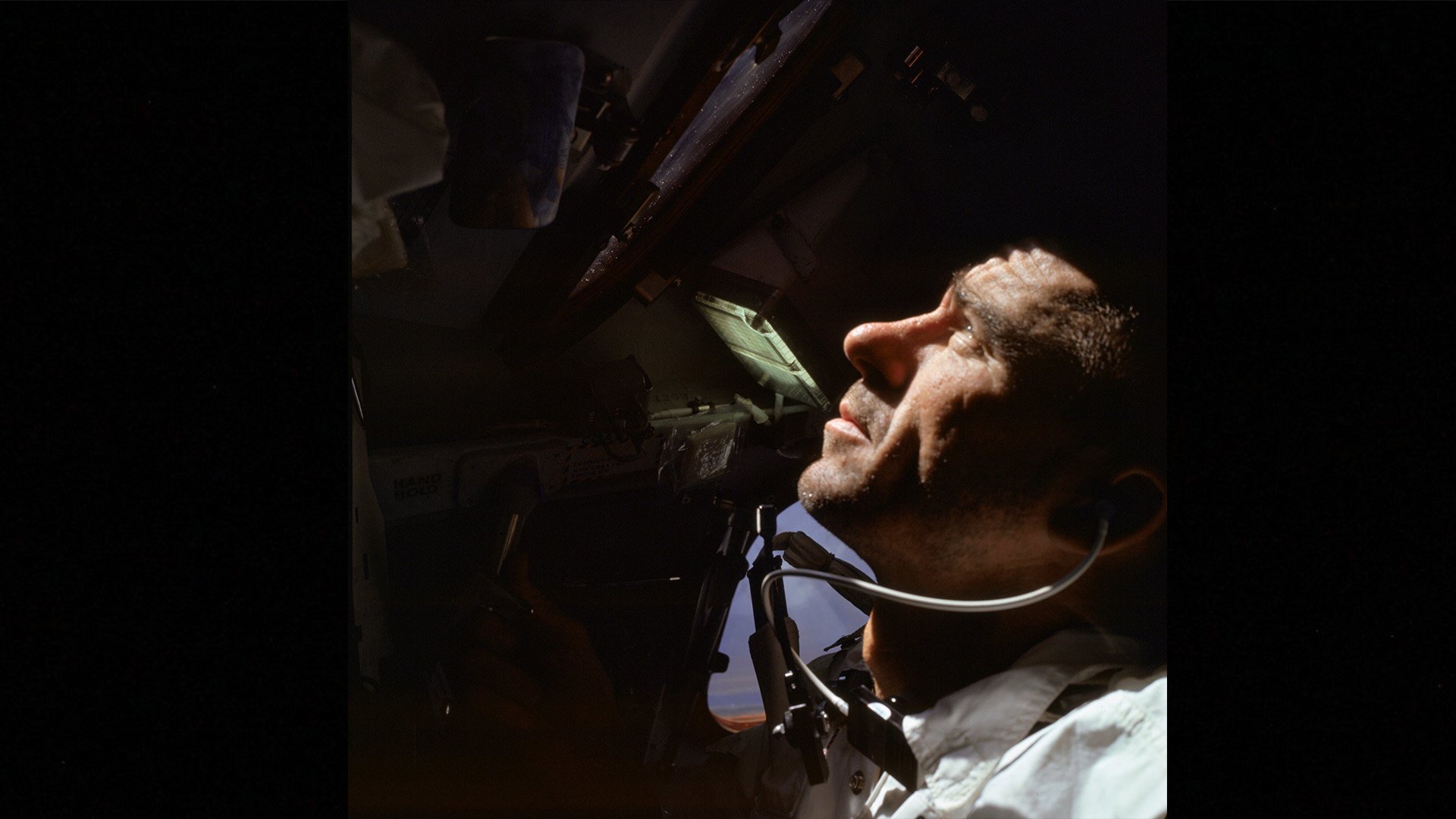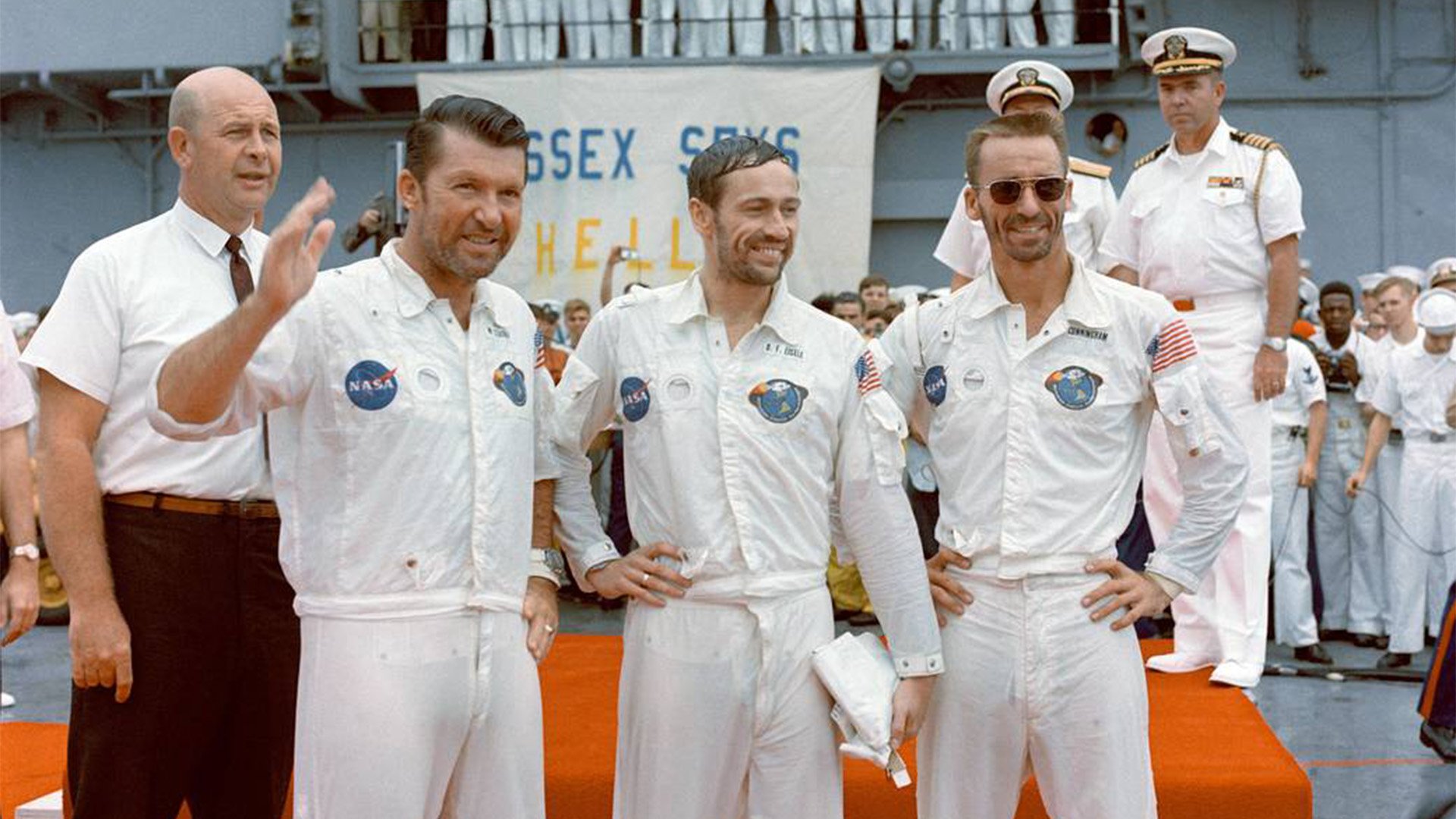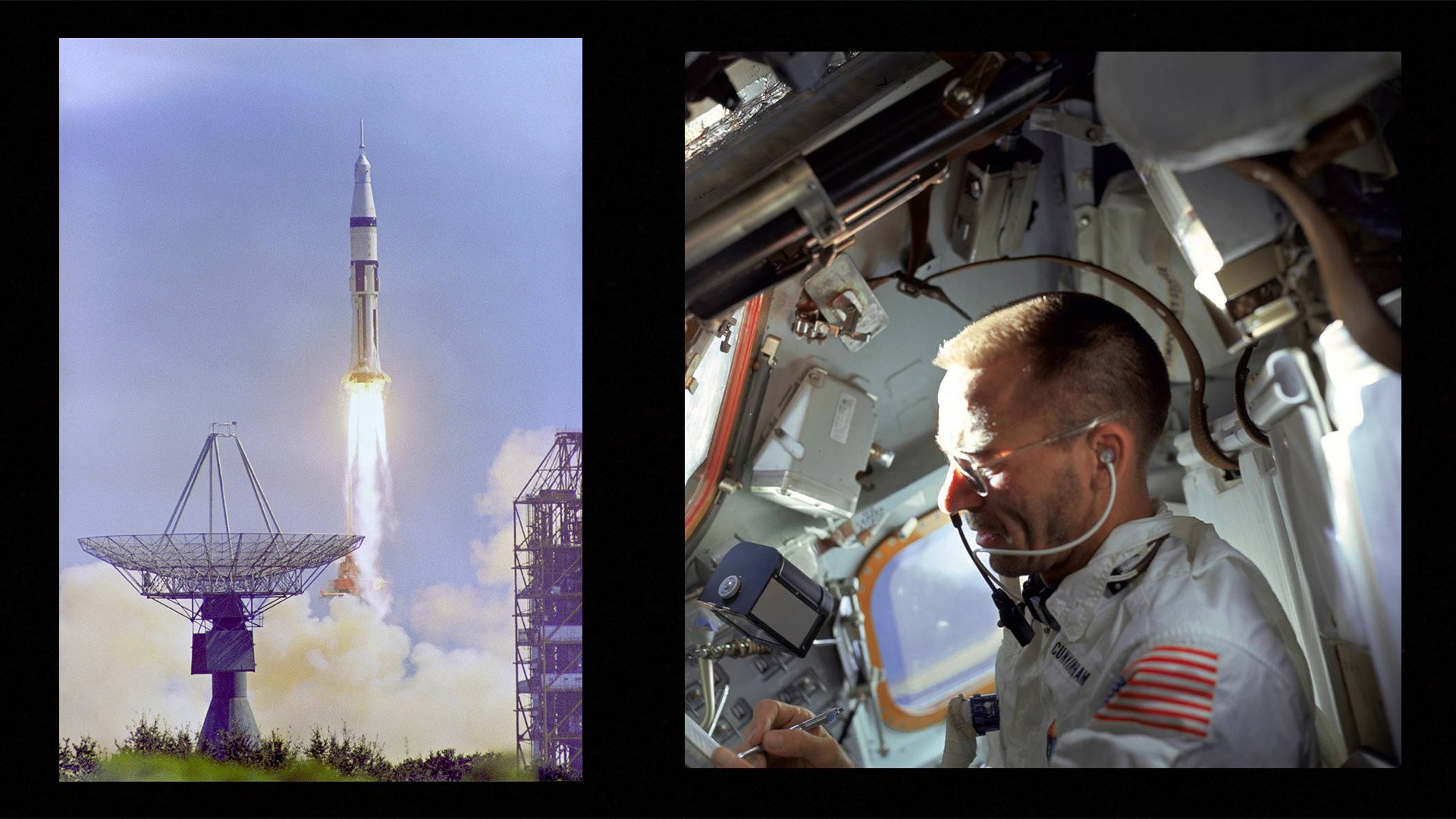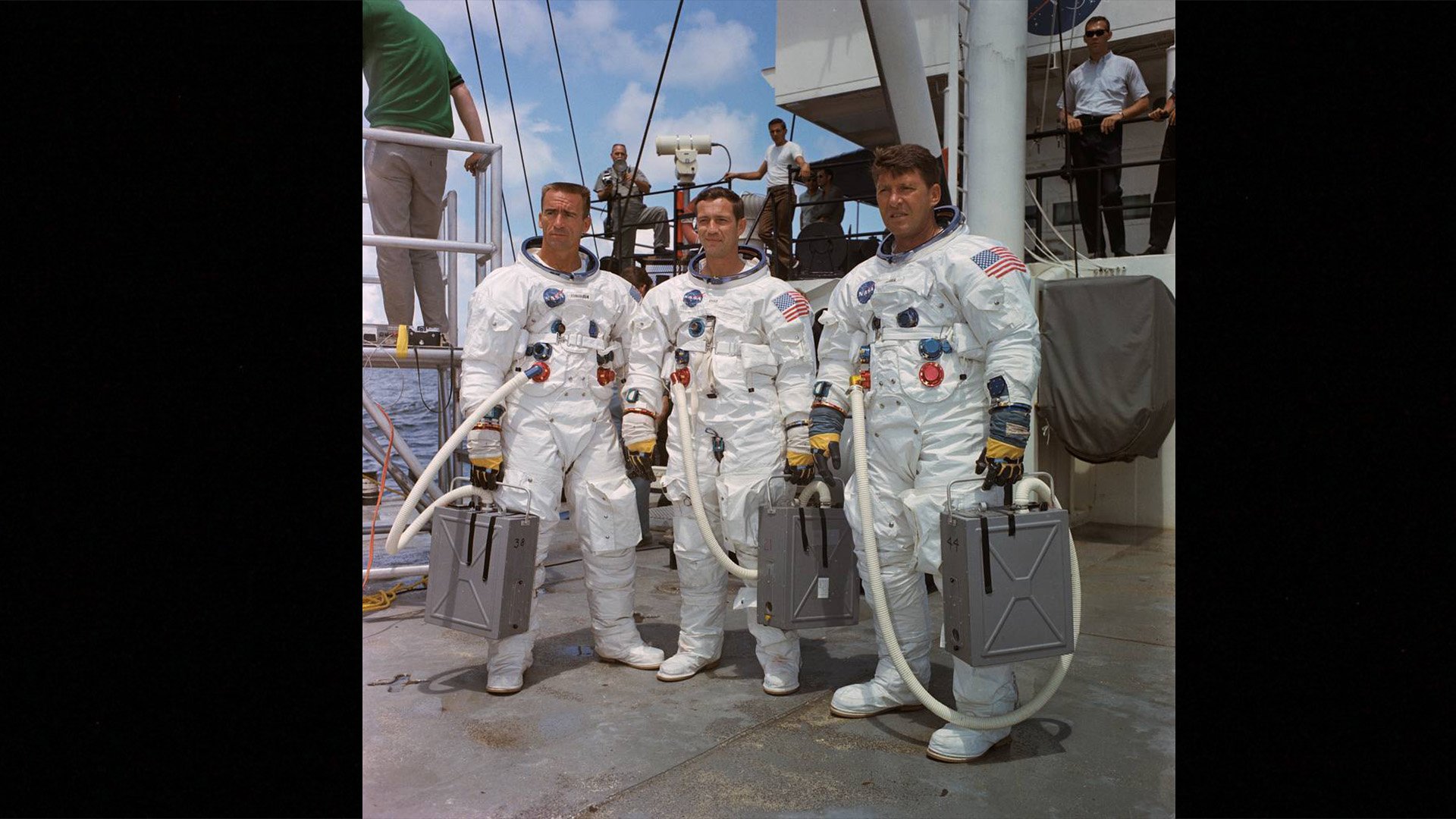
NASA astronaut Walter Cunningham, the Apollo 7 lunar module pilot, photographed during the 1968 mission. Cunningham died Tuesday, Jan. 3, 2023, in Houston, Texas. NASA photo.
Retired US Marine Corps Col. Ronnie Walter Cunningham, who flew night fighter missions during the Korean War before crewing Apollo 7’s daring dash into outer space in 1968, has died.
The last surviving crewman from the Apollo 7 mission, Cunningham passed away Tuesday, Jan. 3, in Houston, NASA announced. He was 90 and had recently suffered a serious fall.
“Walt Cunningham was a fighter pilot, physicist, and an entrepreneur – but, above all, he was an explorer. On Apollo 7, the first launch of a crewed Apollo mission, Walt and his crewmates made history, paving the way for the Artemis Generation we see today,” said NASA Administrator Bill Nelson in a prepared statement announcing Cunningham’s death. “NASA will always remember his contributions to our nation’s space program and sends our condolences to the Cunningham family.”
Cunningham’s family also released a statement, expressing their “immense pride in the life that he lived, and our deep gratitude for the man that he was – a patriot, an explorer, pilot, astronaut, husband, brother, and father. The world has lost another true hero, and we will miss him dearly.”

The crew of the US Navy's recovery vessel, the aircraft carrier Essex, welcomed aboard Apollo 7's astronauts on Oct. 22, 1968, off Bermuda. The astronauts are Walter M. Schirra Jr., commander, left; Donn F. Eisele, command module pilot, center; and Walter Cunningham, lunar module pilot. In left background is Donald E. Stullken, NASA recovery team leader from the Manned Spacecraft Center's Landing and Recovery Division. NASA photo.
Cunningham was born March 16, 1932, in Creston, Iowa. He graduated from Venice High School in California and joined the Navy in 1951, but was sent to the US Marine Corps.
He retired as a colonel in the reserves 24 years later. By then, he’d accumulated more than 4,500 flight hours in 40 different aircraft.
After flying 54 missions in Korea, Cunningham returned to the US to earn undergraduate and graduate degrees in physics from the University of California at Los Angeles in 1960 and 1961, and then worked as a scientist at the nonprofit Rand Corp., studying Earth’s magnetosphere.
NASA selected Cunningham in 1963 as part of the space agency’s third astronaut class. Initially, he served in the Apollo 2 prime crew, but NASA nixed the mission, and he became a backup lunar module pilot for Apollo 1.
A cabin fire swept the Apollo 1 spacecraft during a Jan. 27, 1967, test launch, killing all three astronauts on board the command module.

The Apollo 7 Saturn IB launched from what's now called Kennedy Space Center's Launch Complex 34 at 11:03 a.m. on Oct. 11, 1968. Walter Cunningham was in charge of all onboard spacecraft systems, except launch and navigation controls. He's writing with a space pen on the ninth day of the mission. NASA photos.
Although Apollo 7 didn’t have a lunar module, NASA dubbed Cunningham the mission’s lunar module pilot for the first human flight test of the Apollo spacecraft. He was tasked with operating all onboard systems, except launch and navigation controls.
Apollo 7 blasted off on Oct. 11, 1968, from Cape Kennedy Air Force Station in Florida, hurtling Cunningham, spacecraft commander Walter M. Schirra Jr., and command module pilot Donn F. Eisele on a journey that would take them more than 3.5 million nautical miles across space for nearly 11 days.
Despite testy times with the Houston ground crew, the mission was flawless, proving the maneuvers necessary for docking and lunar orbit rendezvous with the third stage of the Saturn 1B launch vehicle.
It also marked the first live TV transmission of the crew’s cabin activities, with Cunningham handling the camera.
But after splashing down in the Atlantic Ocean on Oct. 22, 1968 — only 7 nautical miles from the recovery ship, the aircraft carrier Essex — none of the three astronauts ever returned to space.

The prime crew of the first manned Apollo space mission, Apollo 7, stands on the deck of the NASA Motor Vessel Retriever after suiting up for water egress training in the Gulf of Mexico. Left to right are astronauts R. Walter Cunningham, Donn F. Eisele, and Walter M. "Wally" Schirra Jr. NASA photo.
NASA named Cunningham to helm the flight crew initiative for the Skylab space station program, but he exited the agency on Aug. 1, 1971.
He entered the private sector and over the next five decades held senior leadership positions with Century Development Corp., Hydrotech Development Co., and 3D International.
In 2018, he joined the Back to Space company to spark a human mission to Mars, serving alongside Buzz Aldrin and Charlie Duke as astronaut consultants.
Funeral proceedings are pending in Texas.
“On behalf of NASA's Johnson Space Center, we are beholden to Walt's service to our nation and dedication to the advancement of human space exploration,” said Vanessa Wyche, the center director, in a prepared statement. “Walt's accomplished legacy will continue to serve as an inspiration to us all.”
Read Next: Coffee in Space: A Brief History

Carl Prine is a former senior editor at Coffee or Die Magazine. He has worked at Navy Times, The San Diego Union-Tribune, and Pittsburgh Tribune-Review. He served in the Marine Corps and the Pennsylvania Army National Guard. His awards include the Joseph Galloway Award for Distinguished Reporting on the military, a first prize from Investigative Reporters & Editors, and the Combat Infantryman Badge.
BRCC and Bad Moon Print Press team up for an exclusive, limited-edition T-shirt design!
BRCC partners with Team Room Design for an exclusive T-shirt release!
Thirty Seconds Out has partnered with BRCC for an exclusive shirt design invoking the God of Winter.
Lucas O'Hara of Grizzly Forge has teamed up with BRCC for a badass, exclusive Shirt Club T-shirt design featuring his most popular knife and tiomahawk.
Coffee or Die sits down with one of the graphic designers behind Black Rifle Coffee's signature look and vibe.
Biden will award the Medal of Honor to a Vietnam War Army helicopter pilot who risked his life to save a reconnaissance team from almost certain death.
Ever wonder how much Jack Mandaville would f*ck sh*t up if he went back in time? The American Revolution didn't even see him coming.
A nearly 200-year-old West Point time capsule that at first appeared to yield little more than dust contains hidden treasure, the US Military Academy said.












